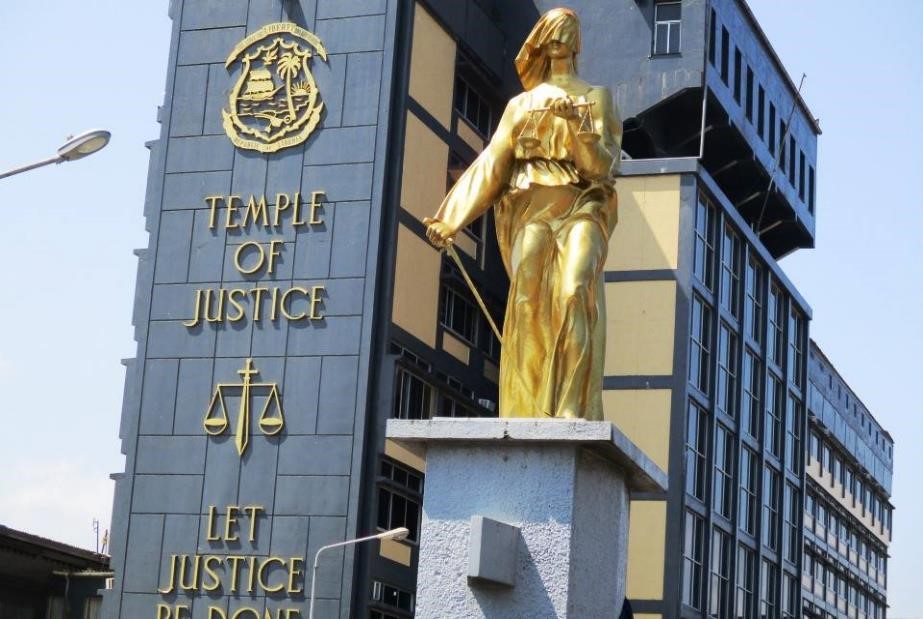MONROVIA, Montserrado – On Tuesday, February 19, Chief Justice Francis Korkpor denied and dismissed a motion for him to recuse himself from presiding over the impeachment trial of Associate Justice Kabineh Ja’neh.
Ja’neh is currently facing an impeachment trial before the Senate to recuse himself from presiding over the matter. His lawyer, Cllr. Arthur Johnson had presented a 10-count petition requesting that the chief justice recuse himself in the interest of justice and fair play.
Johnson justified the request because he said the chief justice and three other justices of the Supreme Court had dismissed an appeal in a case that is a subject of Ja’neh’s impeachment trial.
The defense lawyer said it would be a conflict of interest and against public policy for Kokpor to sit on the impeachment proceedings of the associate justice, having acted and participated in a judgment, the outcome of which is one of the grounds for which his impeachment and removal from office is being sought.
But in his ruling on Tuesday, Korkpor said the defendant did not establish the legal grounds to warrant his recusal.
“Based on what I have said and given the circumstance of this motion to recuse, I hold that the movant has not established any legal and or factual ground for me to recuse myself. The motion to recuse is thereby denied and dismissed, it is hereby so ordered,†Kokpor announced.
The chief justice noted that a request for a judge to recuse himself or herself in a case is a challenge for cause and the cause stated must have a legal and factual basis. He added that the prime purpose for a judge to recuse himself or herself from a case is to ensure that litigants enjoy the neutrality of an impartial trial.
“It is, therefore, wrong for a judge to refuse, without just cause, to sit, hear, and determine a case, just as it is also wrong for a judge to preside over a case over which judicial forbids him or her to hear and decide,†he added.
Korkpor also argued that Article 43 of the constitution confers the duty on the chief justice of the Supreme Court to preside when the president, vice president, or an associate justice of the court is being tried.
“So, as I have said time and again, it is by the dictates of the constitution of Liberia (1986) that I should preside over this impeachment proceeding; it is not of my own making,†he said.
He said there is, however, no provision in the constitution that states who should preside over impeachment proceedings involving the president, vice president, or an associate justice in the absence of the chief justice or when the chief justice is incapacitated or disqualified to preside.
“When I preside over this impeachment trial involving Ja’neh, I hold that I am not ‘conflicted’ and that I did not deviate from the law in the Constance Case to warrant my recusal from presiding over this impeachment proceeding,†he added.
Lawyers representing the House of Representative had also resisted the motion for the chief justice to recuse himself, noting that the motion has no basis in the law. They argued that the defense’s motion for recusal disregarded the constitution and sought to create chaos in the impeachment proceeding.
Johnson, the lead defense lawyer, told reporters after Kokpor’s ruling that although he would file another motion arguing that there was a procedural error in the preparation of the ruling, he accepted the ruling and promised to remain with the embattled justice to the very end.
In August, 49 members of the House of Representatives had voted to impeach the associate justice of the Supreme Court, thus submitting the bill of impeachment to the Senate, which is responsible for conducting the impeachment trial.
The bill was initially introduced by two members of the Coalition for Democratic Change, Montserrado’s fifth and eighth district representatives, Thomas Fallah and Acarous Gray.
Gray and Fallah wrote in their petition that Ja’neh abused his power to prevent a now deceased businessman, Austin Clarke, from collecting a US$1 million judgment in a case of defamation against Ecobank. They cited another case where they say Ja’neh used his influence as a Supreme Court justice “to become both a player and a referee in a land dispute in which no lawyer dared take on him because he is an associate justice of the Supreme Court of Liberia and enjoys the luxurious trappings associated with such office and is hiding behind his office and status to sport with the rights of innocent Liberians.â€
Featured photo courtesy of Senate Press Department



